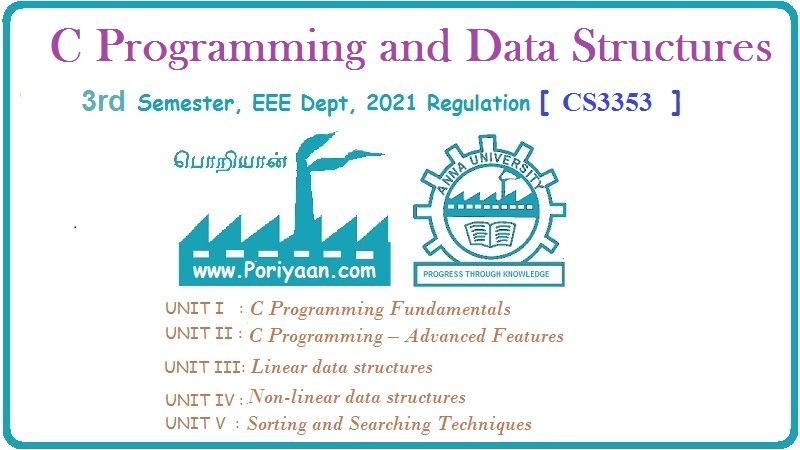C Programming and Data Structures: Unit II: C Programming – Advanced Features
Arrays and Functions
Syntax, Example C programs
Thus instead of actual value, the address is passed as a parameter to the function hence it is called parameter passing by address.
Arrays
and Functions
When
an array is passed as an argument to the function then we are actually passing
the base address of an array to the function. Using this base address we can
access the remaining elements of the array in the function. Thus instead of
actual value, the address is passed as a parameter to the function hence it is
called parameter passing by address.
We will understand this concept with the help
of following example -
#include<stdio.h>
#include<conio.h>
void
main()
{
void
fun(int a[5]);/*function declaration*/
int
a[]={10,20,30,40,50};
clrscr();
fun(a);/*call
to the function*/ Passing the base
address of an array
getch();
}
void
fun(int a[6])
int
i;
}
for(i=0;i<5;i++)
printf("%d",*(a+i));
/*
or printf("%d",a[i]);*/
}
Output
10
20 30 40 50
In
above program array name is passed as an argument to the function then
automatically the base address is passed to the function. This should be done
when we give call to the function. While declaring such a function the array
name along with its data type and square brackets [ ] should be specified. Even
though we do not specify the actual size, it is allowed in C.
For example :
While
declaring the function with an argument as array -
void
fun(int);/*is invalid*/
void
fun(a);/*is invalid*/
void
fun(a[ ]);/*is invalid*/
void
fun(int a);/*is invalid*/
But,
void
fun(int a[6]); /*is valid*/
void
fun(int a[ ]); /*is valid*/
void
fun(int [6]); /*is valid*/
void
fun(int []);/*is valid*/
Similarly in function definition -
void
fun(int [6]) /*is invalid*/
void
fun(int a) /*is invalid*/
void
fun(int[])/*is invalid*/
void
fun(a[6]) /*is invalid*/
void
fun(int) /*is invalid*/
But
void
fun(int a[6]); /*is valid*/
void
fun(int a[]); /*is valid*/
Program: Write a C program to
calculate the sum of all the integers in an array using pointer.
#include<stdio.h>
#include<conio.h>
void
main()
{
int
fun(int []);/*function declaration*/
int
a[]={10,20,30,40,50};
clrscr();
printf("\nSum
= %d",fun(a));/*call to the function*/
getch();
}
int
fun(int a[])
{
int
i,sum=0;
for(i=0;i<5;i++)
sum=sum+
*(a+i);
↓
Using pointer the next location in array is = (a + i) and the value at that location is obtained by * (a + i)
return
sum;
}
Output
Sum
= 150
C Programming and Data Structures: Unit II: C Programming – Advanced Features : Tag: : Syntax, Example C programs - Arrays and Functions
Related Topics
Related Subjects
C Programming and Data Structures
CS3353 3rd Semester EEE, ECE Dept | 2021 Regulation | 3rd Semester EEE Dept 2021 Regulation
